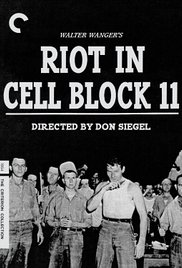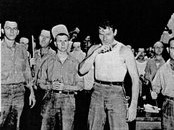Riot in Cell Block 11 **** (1954, Neville Brand, Emile Meyer, Frank Faylen, Leo Gordon) – Classic Movie Review 5657
Director Don Siegel’s masterly 1954 prison drama is low on budget but high on social concern and urgency as a plea for reform of the American prison system and conditions in US jails.
It is based on the experiences of distinguished producer Walter Wanger, who was jailed and served a four-month prison term for shooting agent Jennings Lang after he suspected him of being the lover of his film star wife Joan Bennett. He wanted to make a film about what prison was really like and the appalling conditions he saw while he was in jail.
In the story, the inmates at a punishment block of an American big state jail take advantage of an inexperienced guard and block themselves in as part of a US nationwide wave of riots to protest against brutal guards, bad food, overcrowding and inhumane living conditions. They take several guards hostage, but peace negotiations are blocked by politicians interfering with the prison administration, and by infighting among the inmates.
The story is based on a riot at the Jackson, Michigan, State Prison in April 1952 when the inmates held nine guards hostage for five days. Newsreel footage of the riot and other riots begins the film.
At the movie’s core there is a fine screenplay by Richard Collins, with strongly written roles, especially for Neville Brand as the prison inmates’ leader James Dunn and Emile Meyer as Reynolds the warden.
For authenticity, it was shot on California’s Folsom State Prison locations with real-life guards and inmates as extras and technical advisers. Actor Leo Gordon had served five years for armed robbery at San Quentin State Prison, so Folsom Prison warden Heinze initially objected to him appearing in the film as Crazy Mike Carnie.
Dunn and Carnie are based on the real-life convicts who headed the Jackson, Michigan, riot and the warden is based on the jail’s deputy warden.
Also in the cast are Frank Faylen, Don Keefer, Robert Osterloh, Paul Frees, Alvy Moore, Dabs Greer, Whit Bissell and James Anderson.
The production assistant was Sam Peckinpah, whose father Denver Peckinpah was a law-and-order judge in northern California who could persuade the warden to allow the location shoot in Folsom.
The US Production Code still forbade direct references to homosexuality so the dialogue refers to keeping young inmates away from ‘certain prisoners’.
Wanger teamed again with Siegel for Invasion of the Body Snatchers (1956).
© Derek Winnert 2017 Classic Movie Review 5657
Check out more reviews on http://derekwinnert.com



